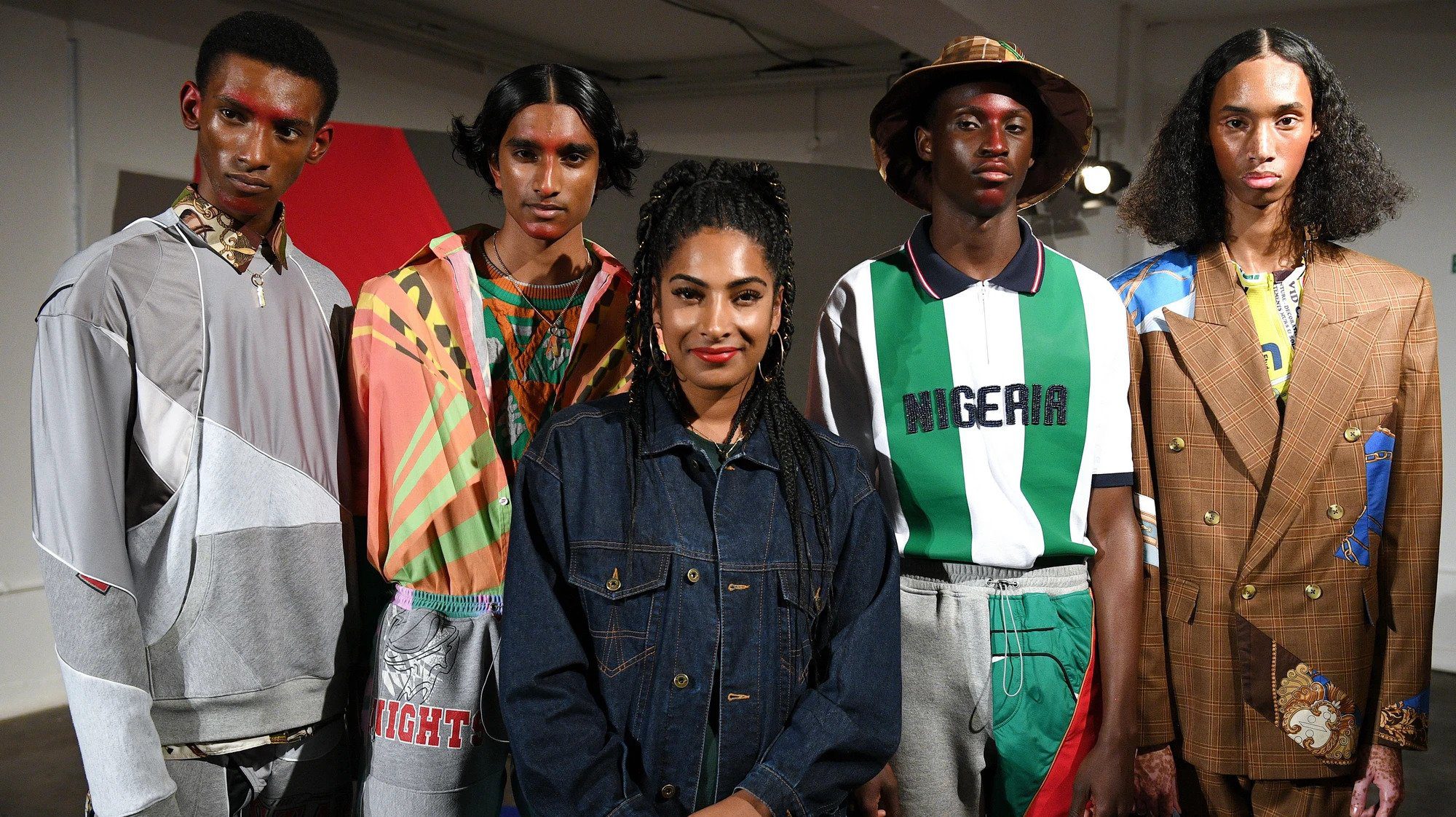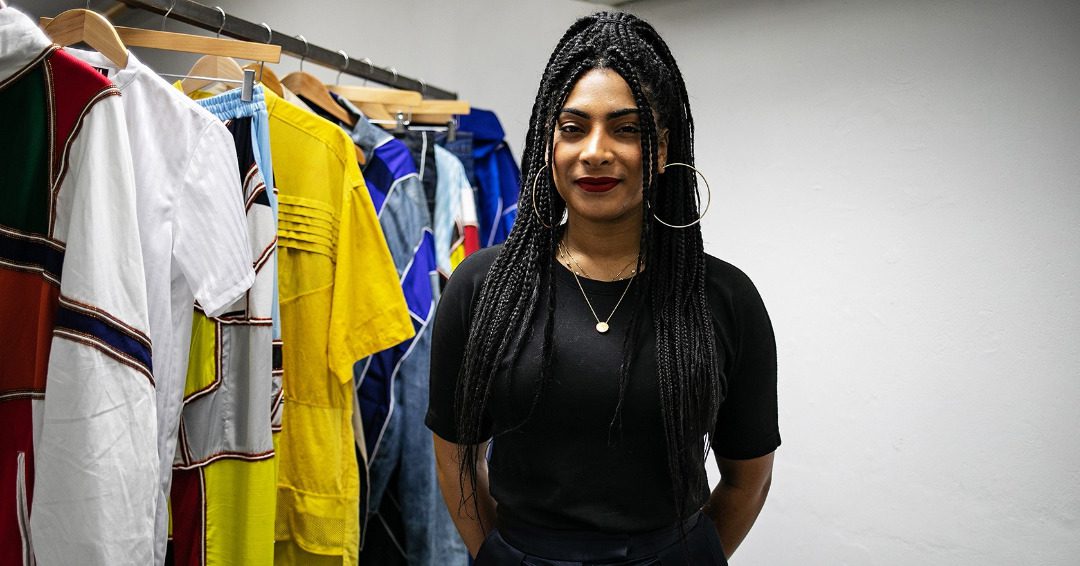(October 18, 2021) Her eponymous label found its roots in heritage and sustainability. Who could have thought that a trip to Lagos in Nigeria and Panipat in India would give birth to a fashion label that will become the face of sustainable fashion in international market? Meet Priya Ahluwalia, a London-based designer who is making people rethink their choices in fashion like no one else. The 29-year-old, in a short span, has become a name to reckon with and is making people sit up and take notice of her designs, one collection at a time.
The designer, who made it to the Forbes 30 Under 30 list last year, is rising up the ladder with her craft that is hugely influenced by her Indian and Nigerian heritage. Here’s the story of this Global Indian who is consciously working to save the planet with every design that she creates.

Priya Ahluwalia with her models
A trip to two countries set the course for her career
Born to an Indian mother and a Nigerian father in London in 1992, Ahluwalia was always fascinated by colors and fashion. In her words, her mother was quite stylish and she loved trying on her clothes constantly. This love for clothing gave birth to her desire of becoming a fashion designer. But since Ahluwalia was quite studious, her mom was keen to make her a lawyer. So when she decided to fulfill her childhood dream and enrolled in the University for the Creative Arts, Epsom for a course in fashion, her family was quite shocked. However, Ahluwalia was sure about her decision.
But during her graduation, something peculiar happened and it set the course of her career. It was on a trip to Nigeria to meet her father in 2017 that Ahluwalia noticed hawkers on the streets of Lagos wearing some obscure items of British clothing. An inquisitive Ahluwalia rolled down the windows of her car to indulge in a chit-chat with them asking them about their clothes. That small rendezvous and some research on the internet led her to the the second-hand clothing market in the city that has stocks coming in from unwanted donations to British charity shops and then sold by various traders for profit. The journey of these clothes left Ahluwalia fascinated and she was keen to explore more about the huge amounts of clothes that are discarded by Western countries each year.
View this post on Instagram
This led her to Panipat in India, a city that’s often described as the garment recycling capital of the world. Seeing the colossal amount of waste clothing that was stacked into mountainous piles and sorted by color, Ahluwalia was both disturbed as well as moved with the scale of the problem. Since the 29-year-old was studying on the Menswear MA course at London’s Westminster University, this inspired her collection during her MA.
“All of this shocked me in a number of ways. Firstly, I couldn’t believe that secondhand clothing was such a big business. I was also completely shocked at the sheer amount of clothes that are discarded, I had never really thought about it properly before. I suppose it is easy to ignore something that you don’t really see. It also really made me cherish craft and tradition in textiles,” she told Ignant in an interview.
The birth of her label
During her trip to both the countries, Ahluwalia began to document what she saw as photographs and soon released a book titled Sweet Lassi that had the imagery of these places as well as the pictures from her MA collection which was made from repurposed fabrics. It was the success of the book and collection that brought the second-hand garment industry onto fashion agenda. Her graduation collection was purchased by British retailer LN-CC and this eventually led to launch her label, Ahluwalia with sustainable principles.
Her debut collection was proof of her conscious choices as she used second hand garment reworked as menswear to highlight the industry’s problem with waste. It’s not just her technique and material choice but also her production methods that set her apart as a designer. For her Summer Spring 2019 collection, the beading on her patchwork pants was done by Sewa Delhi, an organization that specializes in getting rural Indian women into fairly paid work that fits around their family schedule. The collection was such a hit that it won her the H&M Global Design Award 2019. The same year she collaborated with Adidas at Paris Fashion Week for Autumn/Winter 2019 and took over the ramp at London Fashion Week 2020 with her Spring/Summer 2021 collection.
View this post on Instagram
Sustainable fashion is the key
All the pieces at Ahluwalia are made exclusively from recycled deadstock. She is one of those rare young designers who are openly addressing issues like climate crisis and sustainability. “I think the correlation between young designers talking about these issues is that more young designers are of BAME (Black, Asian, Minority Ethnic) backgrounds than ever before. This means that for the first time, designers from ethnic minorities are able to share their stories and work through their own voice,” the Forbes 30 Under 30 designer told CNN.
Since the launch of her label, Priya Ahluwalia has been drawing inspiration from her Indian and Nigerian roots for her collection, and that’s what makes her work unique and intriguing at the same time. “I am always inspired by my heritage and upbringing. I am Nigerian and Indian, and I was brought up in London, they are all places with such a wealth of culture and inspiration. I love the vibrancy of Lagos style, the craftsmanship of Indian textiles and the typical mixed wardrobe of a London man. They fuse together to create collections that are serious and playful at the same time,” she told GQ.
View this post on Instagram
In just three years, Priya Ahluwalia has become a rising star in fashion – someone who is making the world rethink about their sartorial choices and asking the fashion industry to make conscious choice to reduce the carbon footprint by opting for sustainable fashion.


